Key takeaways:
- Hormone balance is vital for overall well-being, influencing mood, energy levels, and physical health.
- Diet and lifestyle changes, including increased healthy fats and regular exercise, significantly improve hormonal health.
- Tracking symptoms and being adaptable in one’s approach helps identify effective strategies for maintaining hormone balance.
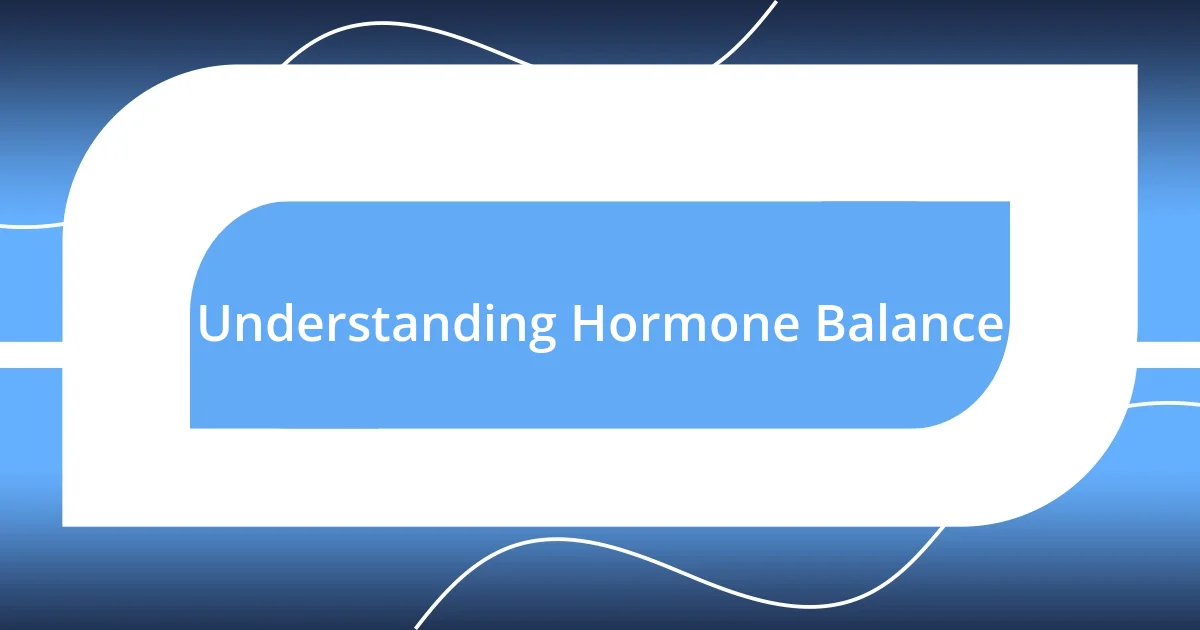
Understanding Hormone Balance
Hormone balance is crucial for our overall well-being, affecting everything from mood to metabolism. I remember a time when I felt like I was on an emotional rollercoaster, wondering why my mood swings felt so intense. It was then I discovered that even small imbalances could have a significant impact on my daily life.
When our hormones are in harmony, we experience more energy and stable emotions. Have you ever noticed how changes in sleep patterns or stress levels can throw everything off? I’ve felt that firsthand; a single week of poor sleep turned my motivation into a sluggish fog, making me realize just how interconnected everything is.
Understanding hormone balance means recognizing that it’s not just about numbers or tests; it’s about listening to our bodies. I often ask myself how stress, diet, and lifestyle choices are affecting me on a daily basis. By tuning into those signals, I’ve learned to manage my health better, aiming for a natural balance rather than relying solely on medications.
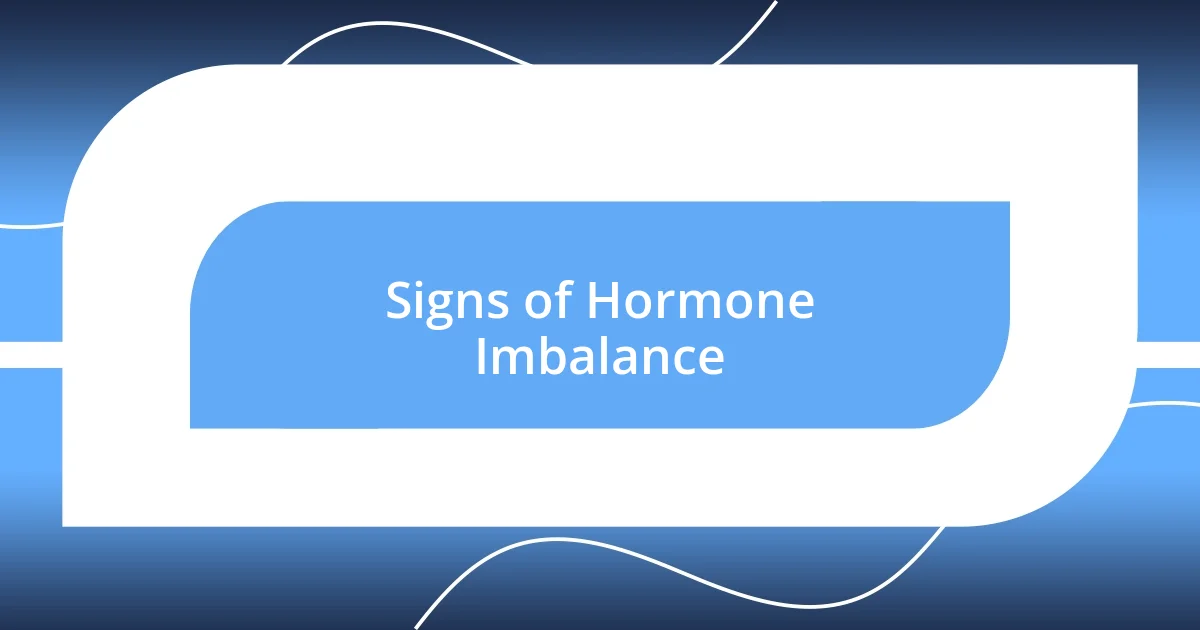
Signs of Hormone Imbalance
Hormonal imbalances manifest in various ways, and recognizing the signs is an essential first step towards correction. For me, it was persistent fatigue that initially alerted me—no matter how much I rested, I still felt drained. This exhaustion, coupled with unexplainable weight changes, nudged me to explore deeper into what could be happening within my body.
Another telling sign might be irregularities in mood or menstrual cycles. I recall a time when I felt a wave of anxiety wash over me out of nowhere, which I later learned was linked to fluctuating hormones. If you’ve experienced feelings of irritability or depression that seem to come out of the blue, it’s worth considering whether your hormones are playing a role.
Physical symptoms, like skin conditions and changes in libido, can be just as telling. I remember looking in the mirror one day and seeing breakouts that felt wholly out of place for my age. I was surprised to learn how much hormones influence our appearance and energy levels, proving that hormonal health plays a vital part in our overall happiness and confidence.
| Sign of Imbalance | Potential Effects |
|---|---|
| Persistent Fatigue | Low energy, difficulty concentrating |
| Irregular Mood Changes | Increased irritability and anxiety |
| Skin Issues | Breakouts, dryness, or changes in skin texture |
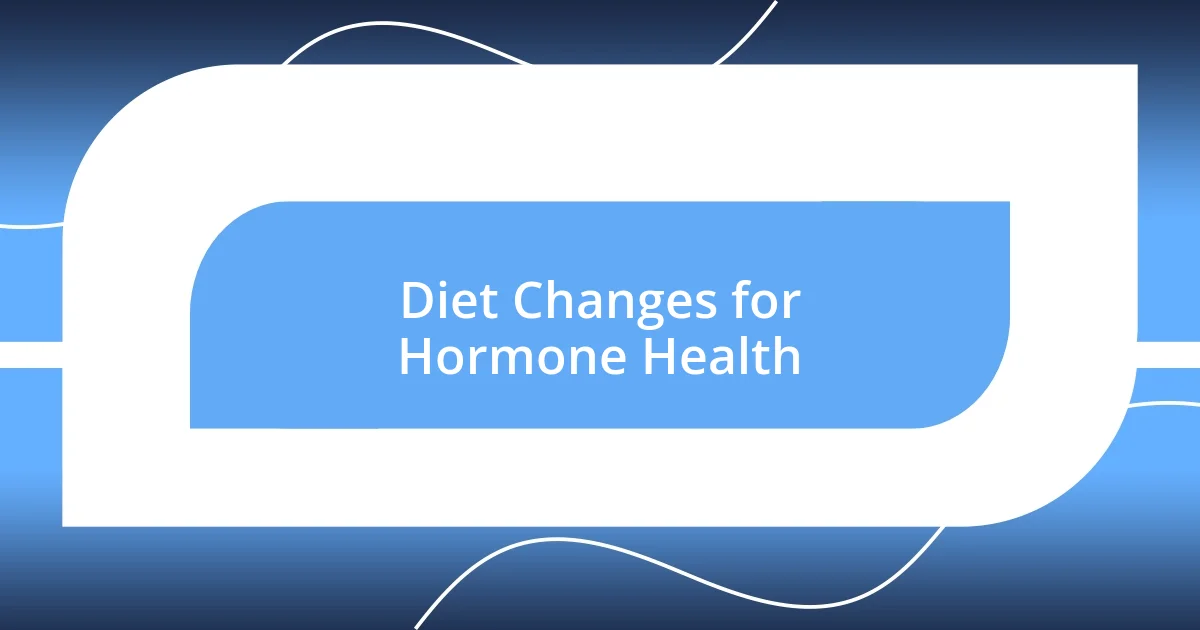
Diet Changes for Hormone Health
Diet plays a remarkable role in hormone health, often serving as a foundation for balance. I recall when I swapped out processed foods for whole, nutrient-dense options. Not only did I feel physically lighter, but my energy levels soared, and my mood stabilized. Integrating more fruits, vegetables, healthy fats, and lean proteins into my meals made all the difference. By being mindful of what I consumed, I began to notice remarkable improvements in my overall well-being.
Here are some key dietary changes that helped me support my hormone health:
- Increase Healthy Fats: Incorporating sources like avocados, nuts, and olive oil can support hormone production.
- Eat Plenty of Fiber: Foods rich in fiber, such as leafy greens and whole grains, help to regulate estrogen levels.
- Limit Sugar and Refined Carbs: Reducing these from my diet helped mitigate mood swings and blood sugar spikes.
- Choose Organic When Possible: I noticed that reducing exposure to pesticides and hormones in food helped my body feel more balanced.
- Stay Hydrated: Drinking enough water was a simple yet effective way to support my body’s overall function, including hormone regulation.
These changes didn’t just create a shift in my plate; they transformed how I felt day-to-day. Even simple swaps like choosing fruits over sugary snacks became enjoyable rituals that reinforced my commitment to better health. Those conscious decisions turned into empowering habits, and I truly believe that what we eat can either uplift or weigh us down.
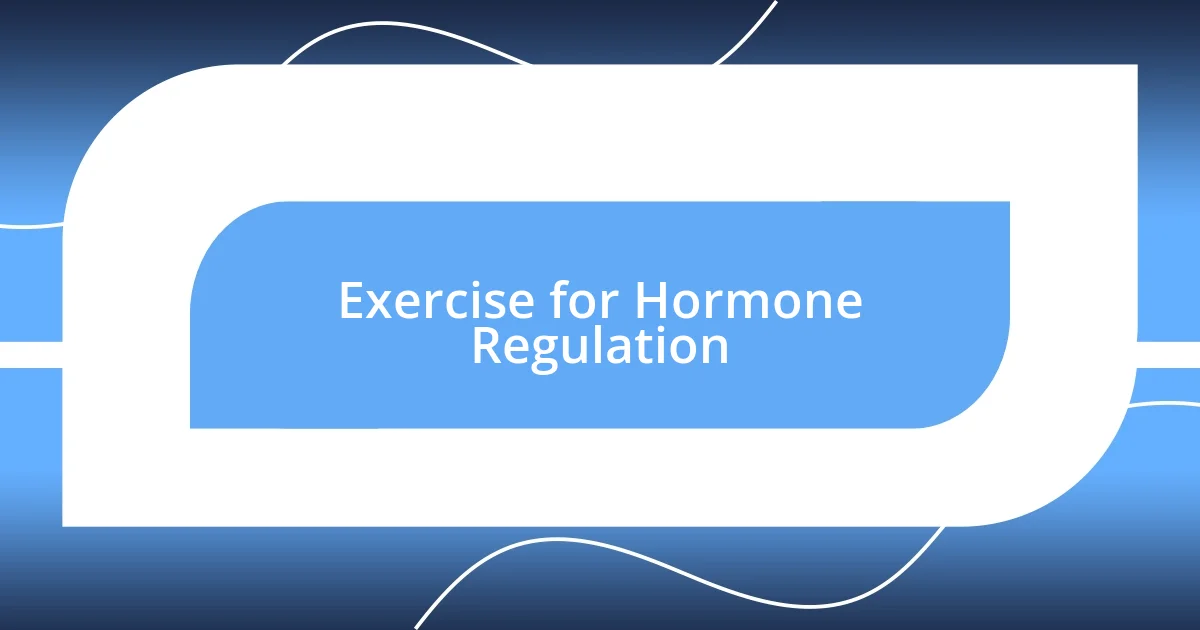
Exercise for Hormone Regulation
Exercise has been a game-changer in my journey towards hormone balance. I used to think that working out was solely about physical appearance, but I soon discovered its profound impact on my hormonal health. After just a few weeks of consistent movement, I noticed my mood lifting remarkably. Have you ever felt that rush of endorphins after a good sweat? It’s like an instant pick-me-up for both body and mind.
I found that mixing up my exercise routine brought fresh energy and focus back to my workouts. Whether it was yoga for stress relief, lifting weights to build strength, or taking long walks in nature, each activity seemed to contribute uniquely to my well-being. I vividly remember a particularly challenging yoga session that left me feeling re-centered and calm—just what I needed to tackle the rest of my day. Isn’t it fascinating how different forms of exercise resonate with our bodies in unique ways?
Research underscores that regular physical activity can help regulate insulin and cortisol levels, both crucial for maintaining hormonal balance. I experienced this firsthand; as I incorporated more movement into my routine, my energy levels stabilized, and my cravings mellowed. It’s like I found the key to a happier, healthier version of myself. If you’re considering ways to balance your hormones, might it be time to lace up those sneakers and embrace movement? Every little step makes a difference in the long run.
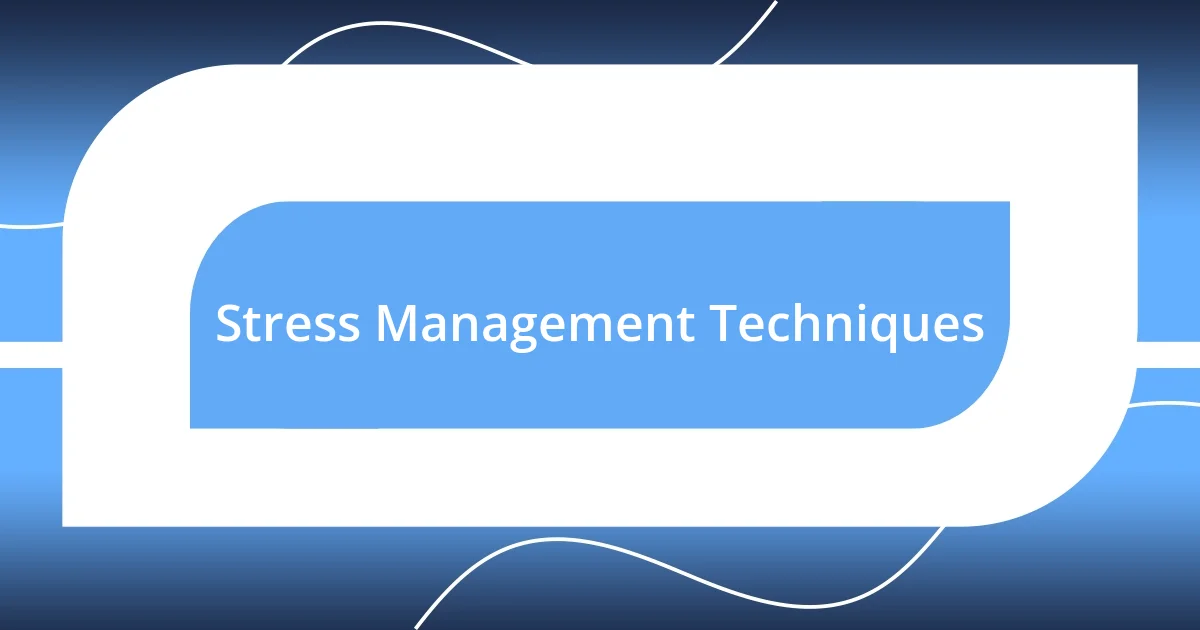
Stress Management Techniques
Stress management has become an essential part of my journey toward hormonal balance. I found that simply taking a moment to breathe deeply during a hectic day could create a ripple effect on my mood. Have you ever noticed how deep breathing can instantly calm racing thoughts? It’s like hitting the reset button for your mind. I often set aside just five minutes to focus on my breath, which reminds me that I have the power to shift my mental state, even amid chaos.
Incorporating mindfulness practices made a significant difference too. I remember the first time I tried meditation; it felt unnatural and awkward at first, but I quickly realized its impact on my stress levels. It’s amazing how sitting quietly with one’s thoughts can illuminate the clutter in our minds. Gradually, I learned to embrace the stillness, allowing me to recharge. If you haven’t tried it yet, you might find that carving out that quiet space could be more beneficial than you expect.
Another technique that really resonated with me was journaling. At first, it was just a casual way to organize my thoughts, but it turned into a powerful tool for self-discovery. Writing down my worries often lifted a weight off my shoulders, letting me see things from a different perspective. Have you ever kept a journal? I highly recommend it, as documenting feelings can often lead to solutions that are hiding in plain sight. Stress management, in all its forms, truly helped me cultivate a sense of harmony and balance within myself.

Supplement Options for Hormones
When exploring supplement options for hormone balance, I’ve found that a few key players make a significant difference. For instance, I’ve personally benefited from incorporating magnesium into my routine. Did you know that magnesium helps regulate cortisol levels? I started taking it before bed, and I noticed my sleep quality improved dramatically. It was like a light switch flipped, and I could finally wake up feeling refreshed.
Another supplement that caught my attention is omega-3 fatty acids. After learning about their anti-inflammatory properties, I decided to try fish oil capsules. I remember feeling a sense of relief as my mood stabilized and those pesky cravings began to diminish. Have you ever noticed how your body reacts when you fuel it with the right nutrients? That’s exactly what I experienced—it’s incredible how nutrition can directly influence hormonal health.
I can’t overlook the role of adaptogens, either. Ashwagandha was a game-changer for me. I was a bit skeptical at first, but within a couple of weeks, I felt more resilient to stress. It’s fascinating how nature provides us with powerful tools to restore balance. If you’re on a similar journey, might it be worth exploring these options? After all, your body’s natural balance deserves just as much attention as your daily routine.

Tracking Progress and Adjustments
Tracking my progress in balancing hormones naturally has been essential in shaping my journey. I started by keeping a detailed journal, not just of my symptoms, but also my mood, energy levels, and even my menstrual cycle. Have you ever noticed how small changes can lead to significant shifts? For me, observing those patterns helped identify what worked and what needed adjustment, creating a clearer picture of my hormonal health.
As I documented my experiences, I realized how vital flexibility is in this process. Initially, I was overly strict with my routines, but I learned that listening to my body is key. When something didn’t feel right, instead of forcing myself to stick to a regimen, I would make small tweaks. This approach not only prevented burnout but also allowed me to stay in tune with my body’s signals. How often do we overlook these subtle hints? Adapting as needed can be a game-changer.
In tandem with journaling, I began utilizing apps designed for tracking hormonal health. This digital companion helped me visualize my progress over time, making it easier to spot correlations between lifestyle changes and hormonal fluctuations. I remember the excitement of seeing how my mood improved as I adjusted my diet or introduced new stress-management techniques. Have you considered using technology to empower your health journey? Embracing these tools enhanced my understanding, fostering a sense of control and empowerment as I navigated my path to balance.












